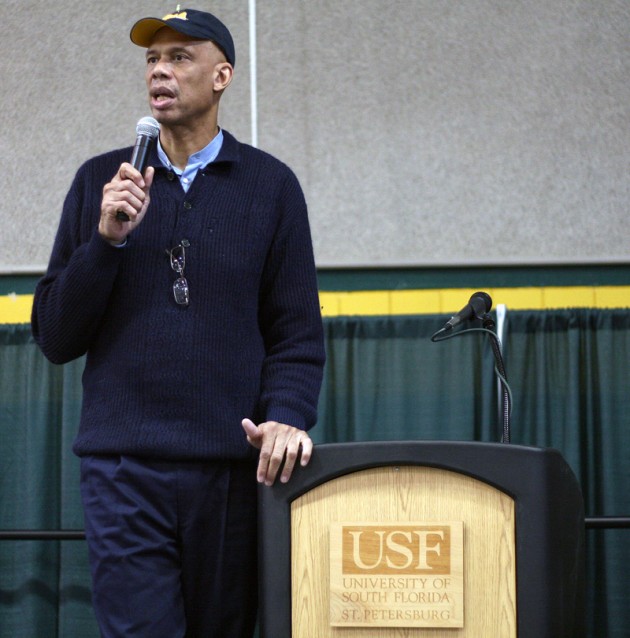Abdul-Jabbar still making an impact

Kareem Abdul-Jabbar wants to be known for more than his record-setting days in basketball. Noted as “the greatest player in college basketball” by ESPN in 2008, Abdul-Jabbar said he has something to tell America.
Since retiring in 1989, Abdul-Jabbar has dedicated his time to writing about African-American history. He spoke Sunday at USF St. Petersburg in honor of Black History month.
The 7-foot-2 former NBA star was the most valuable player six times and is the leading scorer with over 38,000 points. He has written six best-selling books and his latest, On the Shoulders of Giants: My Journey Through the Harlem Renaissance, is close to his heart.
The Oracle: What led you to write this story?
Kareem Abdul-Jabbar: The Harlem Renaissance meant a lot to me, because it’s about my home. It’s the part of New York that I was born and raised in so it’s very important
to me.
It’s some place that I’m very proud of — proud of what they achieved, proud of the political activism in the music, art and other aspects of the Harlem Renaissance have affected black Americans and American society as a whole.
O: What is the book about?
KA: The Harlem Renaissance and the Harlem Rens basketball team, which was a basketball team that played in Harlem. Their home court was a ballroom — a dance and jazz venue. They were the best team you’ve never heard about.
They were the first champions of basketball. Nobody knows about it because they won their championship in 1939 and there’s no footage of it so all you can do is read newspaper clippings.
Most people who saw them play have passed on. The last player who played for that team just died in February. It’s kind of a mythical team. It was the very best team in early basketball.
O: What led you to writing?
KA: I enjoyed reading when I was a kid. I decided that maybe I might have something to contribute.
O: What is the overall message that you’re trying to send to your readers and listeners?
KA: There’s a whole lot more to the black experience than America knows about the rhythm and blues. That is a very important issue with me. How black Americans have contributed a lot to what makes America great and many Americans are totally ignorant as to the depth and breath of what that’s all about.
O: What are you most proud of among your accomplishments?
KA: I’m glad that I’m able to leave more of a legacy than athlete competition.
The fact that I’ve written books that are used in history courses makes me very proud. It means that I’ve left a legacy; that is a lot more substantial than running up and down a basketball court.






